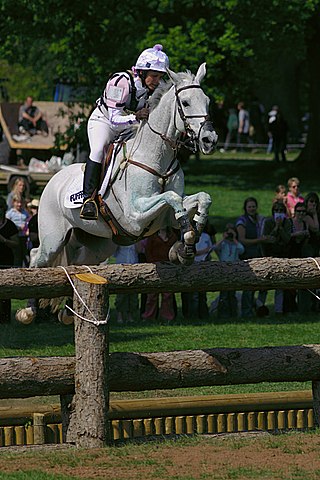
Eventing is an equestrian event where a single horse and rider combine and compete against other competitors across the three disciplines of dressage, cross-country, and show jumping. This event has its roots in a comprehensive cavalry test that required mastery of several types of riding. The competition may be run as a one-day event (ODE), where all three events are completed in one day or a three-day event (3DE), which is more commonly now run over four days, with dressage on the first two days, followed by cross-country the next day and then show jumping in reverse order on the final day. Eventing was previously known as Combined Training, and the name persists in many smaller organizations. The term "Combined Training" is sometimes confused with the term "Combined Test", which refers to a combination of just two of the phases, most commonly dressage and show jumping.

The Tasman Sea is a marginal sea of the South Pacific Ocean, situated between Australia and New Zealand. It measures about 2,000 km (1,200 mi) across and about 2,800 km (1,700 mi) from north to south. The sea was named after the Dutch explorer Abel Janszoon Tasman, who in 1642 was the first known person to cross it. British explorer Lieutenant James Cook later extensively navigated the Tasman Sea in the 1770s during his three voyages of exploration.

A moat is a deep, broad ditch, either dry or filled with water, that is dug and surrounds a castle, fortification, building, or town, historically to provide it with a preliminary line of defence. In some places moats evolved into more extensive water defences, including natural or artificial lakes, dams and sluices. In older fortifications, such as hillforts, they are usually referred to simply as ditches, although the function is similar. In later periods, moats or water defences may be largely ornamental. They could also act as a sewer.
Dyke (UK) or dike (US) may refer to:

A combat engineer is a type of soldier who performs military engineering tasks in support of land forces combat operations. Combat engineers perform a variety of military engineering, tunnel and mine warfare tasks, as well as construction and demolition duties in and out of combat zones.

Cross country equestrian jumping is an endurance test that forms one of the three phases of the sport of eventing; it may also be a competition in its own right, known as hunter trials or simply "cross-country", although these tend to be lower-level, local competitions.

A berm is a level space, shelf, or raised barrier separating areas in a vertical way, especially partway up a long slope. It can serve as a terrace road, track, path, a fortification line, a border/separation barrier for navigation, good drainage, industry, or other purposes.
An assault course is a trail that combines running and exercising. It was more popular in the 1970s than it is now. It is often used in military training. The prime use is to evaluate progress and weaknesses of the individual or the team involved. The term Assault Course can be replaced by Obstacle Course, which some view as more accurate. Confidence Courses is another term used. There are also specific Urban Obstacle Courses and Night Obstacles Courses. An Obstacle Course Race (OCR) is a civilian sporting and fitness challenge event which combines obstacles and cross country running.

Command of the sea is a naval military concept regarding the strength of a particular navy to a specific naval area it controls. A navy has command of the sea when it is so strong that its rivals cannot attack it directly. This dominance may apply to its surrounding waters or may extend far into the oceans, meaning the country has a blue-water navy. It is the naval equivalent of air supremacy.

TREC, short for the French Techniques de Randonnée Équestre de Compétition is an equestrian discipline designed to test horse and rider. With origins in France, the sport has spread through Europe, and was introduced to the UK by the British Horse Society (BHS) in 1998. The sport is now known as British TREC and is run by TREC GB. TREC competitions consist of three separate events (phases) - mounted orienteering, a demonstration of control of the horse's paces and an obstacle course - all completed over the course of one or two days, and points scored, with the highest scoring being declared the overall event winner.
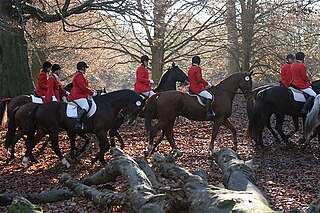
A field hunter, or a fox hunter, is a type of horse used in the hunt field for fox hunting and stag hunting.
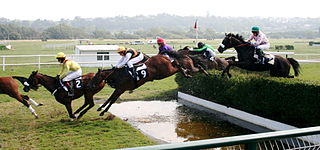
A steeplechase is a distance horse race in which competitors are required to jump diverse fence and ditch obstacles. Steeplechasing is primarily conducted in Ireland, the United Kingdom, Canada, United States, Australia, and France. The name is derived from early races in which orientation of the course was by reference to a church steeple, jumping fences and ditches and generally traversing the many intervening obstacles in the countryside.

Kristian "Ditch" Davey is an Australian actor known for his role as Evan Jones in the Seven Network's Blue Heelers from 2001 to 2006, and for playing the lead role of Julius Caesar in Netflix Season 2: Master of Rome Roman Empire in 2018.
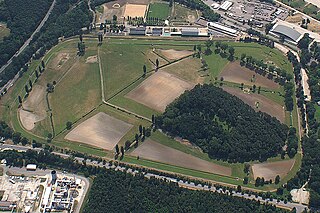
Velká pardubická is a cross-country steeplechase run in Pardubice, Czech Republic since 1874. It takes place every year on the second Sunday in October.
The 1840 Grand Liverpool Steeplechase was the second official annual running of a steeplechase, later to become known as the Grand National Steeplechase handicap horse race, which took place at Aintree Racecourse near Liverpool on Thursday 5 March 1840 and attracted a then smallest ever field of 13 runners.
Various obstacles are found in competitive sports involving horse jumping. These include show jumping, hunter, and the cross-country phase of the equestrian discipline of eventing. The size and type of obstacles vary depending on the course and the level of the horse and rider, but all horses must successfully negotiate these obstacles in order to complete a competition. Fences used in hunter and eventing are generally made to look relatively rustic and natural.

In military engineering, a ditch is an obstacle designed to slow down or break up an attacking force, while a trench is intended to provide cover to the defenders. In military fortifications the side of a ditch farthest from the enemy and closest to the next line of defence is known as the scarp while the side of a ditch closest to the enemy is known as the counterscarp.
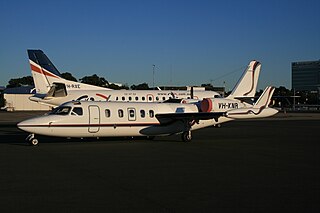
The 2009 Pel-Air Westwind ditching or Norfolk Island ditching was an aircraft accident on 18 November 2009 near Norfolk Island, Australia. A Westwind II jet operated by Pel-Air was conducting an air ambulance flight for CareFlight International when it was forced to ditch after being unable to land in bad weather and not having sufficient fuel to divert to an alternate destination.

The term lowland castle or plains castle describes a type of castle that is situated on a lowland, plain or valley floor, as opposed to one built on higher ground such as a hill spur. The classification is extensively used in Germany where about 34 percent of all castles are of the lowland type.
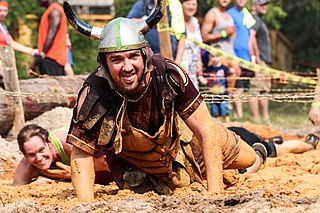
Obstacle course racing (OCR) is a sport in which a competitor, traveling on foot, must overcome various physical challenges in the form of obstacles. Races vary in length from courses with obstacles close together to events of several kilometers which incorporate elements of track, road and/or cross country/trail running. Courses may include climbing over walls or up ropes, monkey bars, carrying heavy objects, traversing bodies of water or mud, crawling under barbed wire, and jumping through fire.















